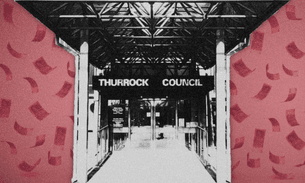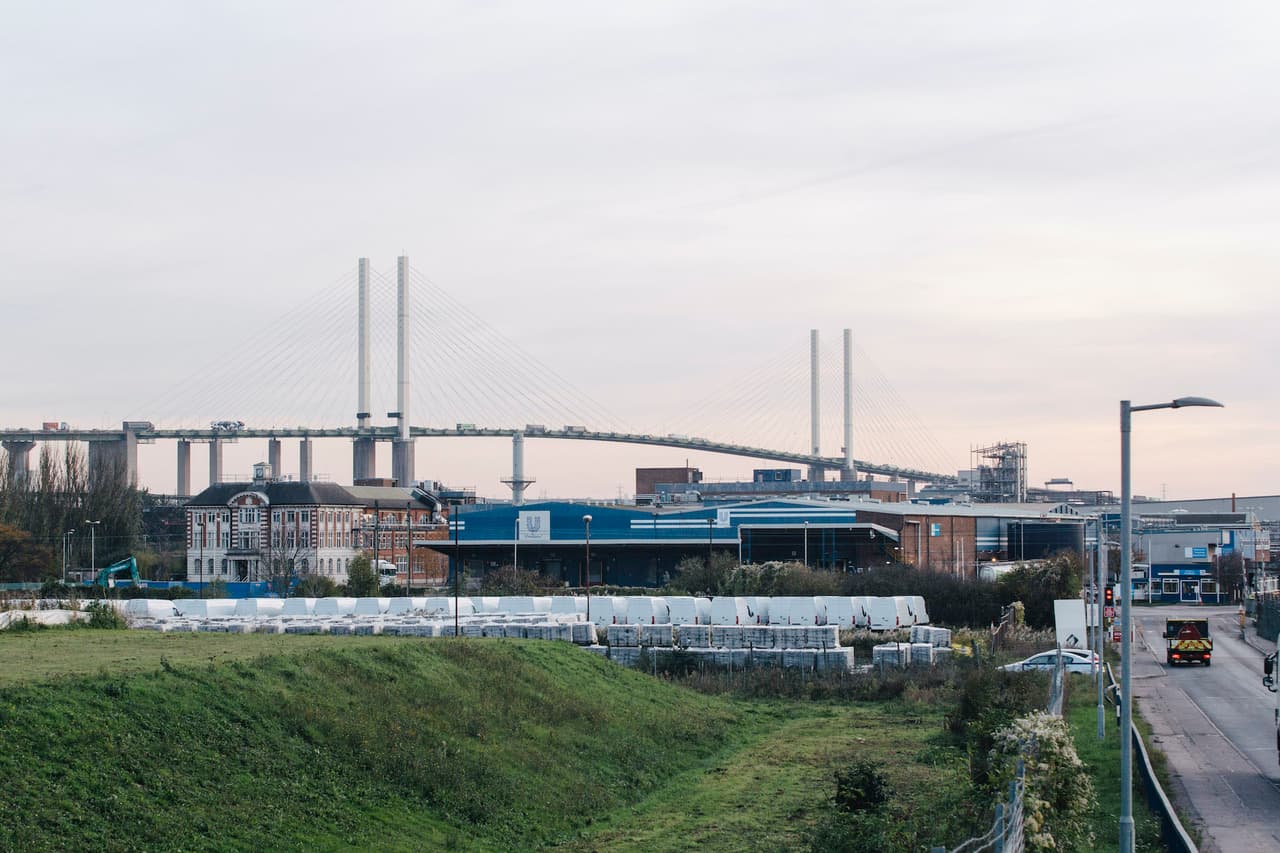
Council borrowed £1bn from taxpayers to bet on British sunshine
Among Thurrock’s rundown council estates and neglected public parks, typical of many towns after a decade of austerity, there is nothing to suggest that over the past three years the local council has borrowed and then invested hundreds of millions of pounds of other councils’ money.
Under the direction of a senior council officer Thurrock borrowed from about 150 local authorities across the UK with little public scrutiny. These loans were not for direct funding of council services, or investing in infrastructure – instead they financed solar farms more than a hundred miles away.
Sean Clark, Thurrock’s director of finance, oversaw the investment of £604m in the solar industry, investments he says were prompted entirely by intermediaries approaching him with money-making opportunities. In an extraordinary interview with The Bureau, Clark wondered whether he had gone too far. At last count Thurrock owed other councils an unprecedented £1bn.
What neither Clark nor the council will disclose is which local authorities he borrowed from or what companies he invested in. To do so, they say, would harm Thurrock’s commercial interests and put off potential lenders.
However, an investigation by The Bureau has discovered the council has poured at least £74m, and possibly hundreds of millions more, into a single company, Rockfire Capital, whose financial model raises serious questions over how likely it is that the public money would be recovered in full if the business failed. This revelation comes at a time when many councils’ finances have been hit hard by the coronavirus crisis.
The situation in Thurrock is arguably the most stark example yet of the commercialisation of local councils, with town halls across the country turning to increasingly inventive money-making schemes to replace funding cut by central government. In 2018, the Bureau revealed that Spelthorne council had borrowed £1bn to play the property market, despite having an annual budget of just £22m. These schemes are made possible by easy access to cheap financing, in Thurrock’s case from other councils.
Thurrock, which is in Essex, describes itself as “unashamedly” focused on revenue, and says the returns from its investments have been put back into services. But the Conservative-led council has not been fully open with The Bureau or the wider public about how those profits were made.
John Kent, the former Labour leader of Thurrock council, called on the current administration to come clean. He said: “People absolutely need to be aware that the council has borrowed £1bn – that’s billion with a b.” He claimed that the council had declined to give elected members or the public adequate details of precisely how it invested the money.
Open for business
Thurrock’s investments in the solar industry began in 2016 after brokers used by Warrington council introduced Thurrock council officers to an investment management company, Rockfire Capital.
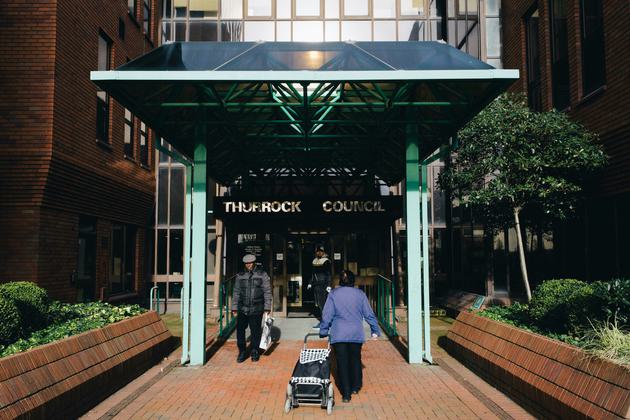 Thurrock council owes other councils more than £1bn
Alex Sturrock
Thurrock council owes other councils more than £1bn
Alex Sturrock
Warrington had already invested in five solar farm bonds connected to the company when its brokers told Thurrock about an opportunity to invest in a large solar farm near Swindon. It would become the deal that launched Thurrock’s unparalleled borrowing and investments.
But there are serious questions over the degree of security of investments in Rockfire Capital. The company has raised a total of £432m from local authorities, including Newham, Bexley and Havering, using bond schemes. Money raised by Rockfire was then paid to a separate company and, following that, distributed among numerous holding companies connected to each solar farm project.
Rockfire says that these companies do not constitute a group. The various businesses in the network are all controlled by Liam Kavanagh, the founder of Rockfire Capital.
Our investigation found that paperwork for key companies is unavailable for public scrutiny. For example a company Thurrock paid £74m to in a single year – Rockfire Capital Bonds Ltd – has not filed accounts covering the period when the payments were made.
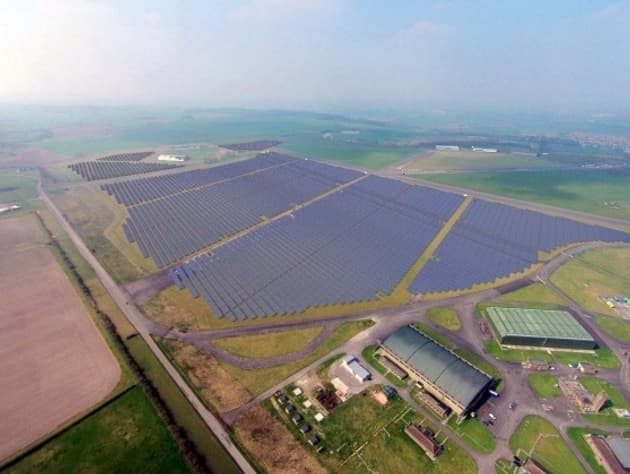 Thurrock invested in Swindon Solar Park in 2016
Twitter
Thurrock invested in Swindon Solar Park in 2016
Twitter
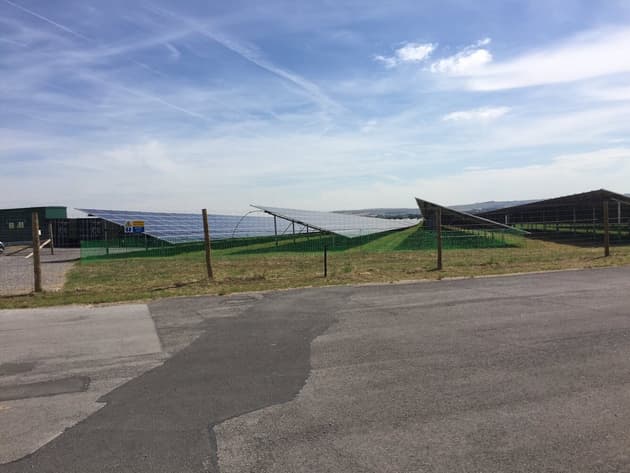 The deal came as a surprise to councillors
Twitter
The deal came as a surprise to councillors
Twitter
Furthermore, during an ongoing civil legal dispute, Rockfire has alleged that 15 of the solar farms bought with council money were riddled with “defects”; £40m from Thurrock was used to buy the sites at the centre of the case. A trial is expected to take place later this year.
The bonds are secured against the solar farms themselves. Rockfire’s seemingly high company debt in comparison with a Financial Times estimate of the value of its farms suggests investors – and therefore taxpayers – are taking on a large degree of risk.
Rockfire has rejected the methods used to estimate the value of their solar farms, and said there is no evidence it has ever had any cash flow problems and that it has never failed to pay an investor its interest on time and in full.
Sean Clark was so confident in the council’s investment strategy that he offered a written endorsement on Rockfire’s website, recommending the company to other investors. After we first contacted Rockfire in February, its website was taken down. It remained down at the time of publication.
When asked by the Bureau, the council refused to confirm how much money it had invested in Rockfire. However, information given on the record by Rockfire and every other council to invest in the company suggests that Thurrock may have invested as much as £420m in bonds connected to the business.
What is not in question is the money that Kavanagh, Rockfire’s founder and chief executive, has received from the business while his company pulled in hundreds of millions of pounds of public money – £7.7m in dividends since 2015.
Just the beginning...
Thurrock’s councillors were taken by surprise when it was announced, in September 2016, that the authority had invested in a solar park in Swindon, about 120 miles away. The deal had been agreed behind closed doors using delegated powers four months earlier, after that year’s election but before the new Conservative administration had taken office.
“It was signed off by officers with no reference to members whatsoever,” said Labour’s John Kent, who was the leader of the council at the time. “I knew absolutely nothing about it.” The council blamed a “period of commercial sensitivity” for the secrecy but even when the deal was announced councillors were not given the full facts.
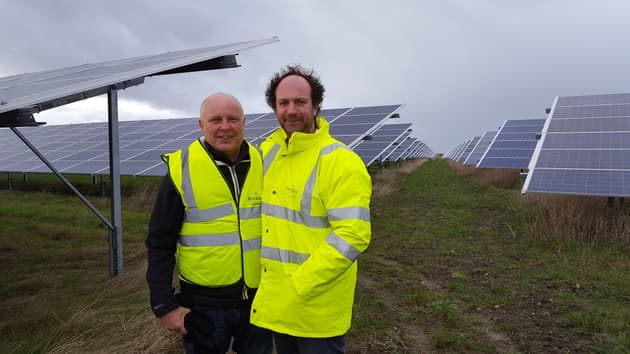 Warrington councillor Russ Bowden with Liam Kavanagh at Swindon Solar Park in 2016
Twitter
Warrington councillor Russ Bowden with Liam Kavanagh at Swindon Solar Park in 2016
Twitter
They were told £15m had been invested in a bond issued by Rockfire Capital, which owned the solar park, alongside Warrington and Newham councils. But our investigation found that, by the time the deal was announced, the council had actually invested £34m, almost all of which was for the Swindon site. There was no mention of this extra spending at the time. Meanwhile Thurrock hailed the investment as showing the phrase “open for business” was “no longer just a label on the front door of this council, but a reality”.
Thurrock council said that when making investments public, it balanced transparency against commercial sensitivity.
The Swindon investment would indeed prove to be only the beginning. Sean Clark, the finance director who arranged it, told The Bureau: “We did the deal with Rockfire (for the Swindon site) that got us into this in the first place. They were dealing specifically with Warrington (to begin with). They didn’t come looking for local authorities. They had the bond advertised in a national newspaper and someone from Warrington picked up on that and were, like, ‘Why do you need the private sector?’”
“I wait for opportunities to come to me”
Since the Swindon deal, Thurrock’s investment in renewable energy has increased exponentially. According to its 2018-19 accounts, published last June, the council had £702m tied up in renewable energy investments. Of that money, £604m is specifically in solar. All of the deals, and the borrowing that funded them, were arranged by Clark. But they were not, apparently, his idea. Instead he told The Bureau all of the investments had been prompted by “intermediaries” coming to him with money-making opportunities.
“We’ve never gone out looking,” he said. “I wouldn’t do that. I wait for opportunities to come to me … people have come to us on different occasions with different opportunities, some small, some larger. Word then gets around that we do these things and people come to us.”
He added: “I’m not saying they were advising us to do it.”
So who did? Most councils pay independent treasury advisers to provide guidance about borrowing and investments. Thurrock’s treasury advisers were Arlingclose, one of two main specialists in the field. Clark told The Bureau that he had not consulted with the company about the loans he was taking out or the investments he was making.
“When we did this our due diligence wasn’t through our treasury advisers,” he said. “It was more through professional organisations like some of the big accounting firms, some of the big legal firms and valuation type firms.”
Clark said Arlingclose had ceased to be the council’s advisers as of 31 March 2019. Asked why, he cited “differences of opinion”.
Thurrock did not announce the breakdown in the council’s relationship with Arlingclose publicly and the council continues to operate without a treasury adviser. Jane Pothecary, Labour group leader before she stepped down earlier this month, said she had no idea Arlingclose had not been consulted about the investments, nor that it was no longer working with the council. It was a “reasonable assumption” the company should have been asked for advice, she said, “otherwise what is the point in having them?”
Abhishek Sachdev, an experienced treasury manager with Vedanta Hedging and a Conservative councillor in Hertfordshire, said he believed the company should have been consulted because assessing and challenging council borrowing “is arguably what they are paid to do”.
According to the council, the company was not consulted because the investments were “outside its area of expertise”. Arlingclose declined to comment when contacted by The Bureau.
 Thurrock has ploughed most of its borrowing into the renewable energy sector
Alex Sturrock
Thurrock has ploughed most of its borrowing into the renewable energy sector
Alex Sturrock
Over the limit
The sidelining of Thurrock’s main financial advisers is more alarming because Clark has the power to borrow and invest huge sums of money largely outside public scrutiny, and there are concerns he may have done so in contradiction of national guidelines, which state that councils must not borrow more than or in advance of need purely in the interests of profit.
Clark said he did not believe his borrowing qualified as loans taken in advance of need. “The auditors have been all over this in the last three years and they have all been happy to sign off on this approach.”
According to the Chartered Institute of Public Finance and Accountancy (Cipfa), which oversees the rules for local authority borrowing, these were never intended to accommodate borrowing on a grand scale to fund councils’ financial investments.
"If local authorities take on substantial debts to make commercial investments with the aim of supplementing their ordinary revenues, there are two big concerns,” Cipfa’s head of policy, Don Peebles, said. “One is that this debt has to be repaid irrespective of whether those investments perform, and second there is the concern that council services will become dependent on commercial income.”
According to the council’s constitution Clark, as director of finance, has the authority to arrange borrowing “in such form as he deems appropriate” as long as it is within agreed limits, which are voted on by councillors when the coming year’s budget is set each February.
Any “material change” to the strategy during the year requires a new vote at a full council meeting. Yet, in 2018-19, Thurrock’s borrowing exceeded the agreed limit by £103m without such a vote taking place. The council told The Bureau the rules allowed the limit to be amended “retrospectively”, even though the borrowing would have taken place before the limit was revised.
What’s more, a council document shows Clark can make short-term investments of up to £10m without consulting elected members. Larger deals require party leaders to be given only an overview before any firm commitment is made. But Kent and Pothecary told The Bureau they had never received briefings about individual investments from Clark or any other council officer. They say such meetings should have been a regular occurrence.
However, Thurrock says that a “full briefing of the largest investments was provided to the leaders and deputy leaders of the three major parties”.
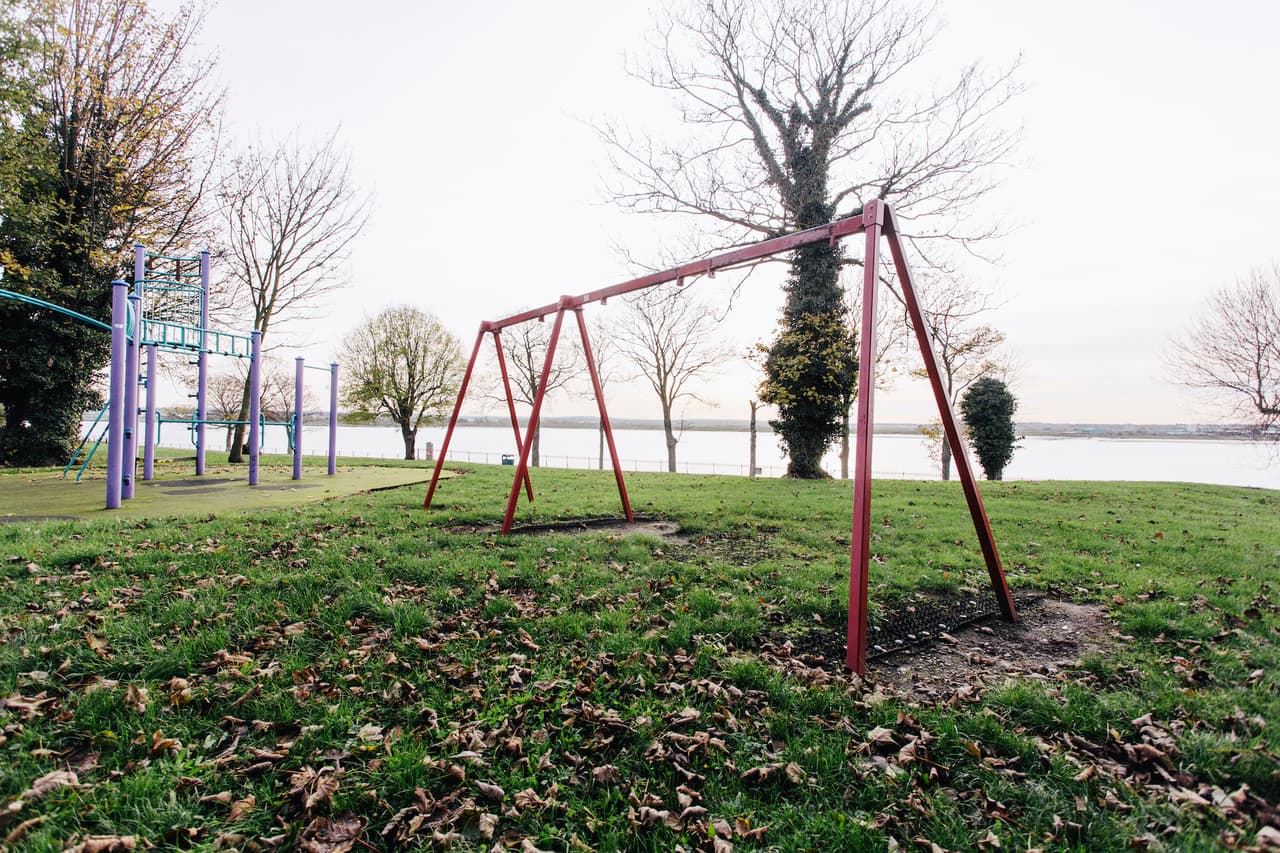
Transparency? What transparency?
Councillors are not alone in feeling they have been kept in the dark. Despite the fanfare given to the Swindon solar farm deal in September 2016, our investigation could find no mention in the council’s public reports of individual investments after that date, even though nearly £700m more has been invested in the renewable energy sector.
Clark once hailed the Swindon investment as attaining the “highest ethical, commercial and transparent standard”. Yet at every step of our investigation he and the council have refused to be fully transparent about the deals that followed.
First we asked which councils they had borrowed from. When no answer was forthcoming we submitted our questions as a freedom of information (FOI) request. During our interview, Clark said that it was up to him and his team to decide whether the information would be released. He refused. The response we received said identifying the local authorities would be “detrimental” to the council’s “ongoing borrowing requirement to fund capital investments in Green Energy Bonds … that the council maintains via borrowing ... from other local authorities on a rolling basis”.
Second we asked for copies of any correspondence between the council and its now former advisers Arlingclose. Thurrock rejected this FOI too, asserting that the advice supplied by the company was confidential, adding that releasing details of its “borrowing intentions” relating to its investments would have a “negative commercial impact on the council”.
Finally, we asked for a breakdown of all the council’s investments, and specifically how much money it had with Rockfire Capital. Again our questions via the council’s press office, and later through an FOI, were turned down.
In responding to the FOI, the council said: “Disclosure of information would result in other companies that offer similar investments not wanting to work with the council. This will have a negative impact on the council’s ability to seek suitable investment deals going forward.”
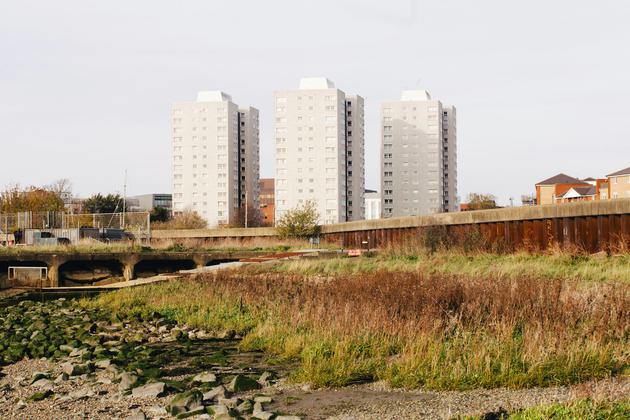 Thurrock took out loans from about 150 local authorities across the UK
Alex Sturrock
Thurrock took out loans from about 150 local authorities across the UK
Alex Sturrock
All of these decisions were upheld by the council and we are now in the process of appealing to the Information Commissioner’s Office.
Scale of borrowing revealed
Thurrock may be determined to withhold the full facts, but other councils have been more forthcoming.
Successful FOI requests to 40 local authority lenders and borrowers (Thurrock was one of only two councils to reject the request in full) allowed us to account for nearly £250m of the money Clark borrowed from the likes of the Greater London Authority, Cornwall and Leicester councils.
But that was just a snapshot of outstanding loans as of June 2019. It does not come close to telling the full story of Thurrock’s borrowing since that first deal in Swindon was signed off in May 2016. Because Clark’s modus operandi is a perpetual cycle of borrowing from one council, investing the money, and then paying the council back by borrowing from another – and that these loans could be as short as one month – the total number of councils involved is likely to be higher.
During our investigation we discovered a more accurate measure of the scale of Thurrock’s borrowing within documents detailing the payments it makes to suppliers – data it is obliged to publish under transparency rules. This showed the council had made interest or loan repayments to at least 150 local authorities in nearly every part of the UK, from every type of council to police and crime commissioners and fire authorities, between April 2016 and September 2019.
Checks with just a dozen councils on the list revealed nearly £700m in loans to Thurrock, including £141.5m which were outstanding as of January 2020. And these figures may still significantly understate the amount of money moving in and out of the council at any one time and the number of other local authorities involved.
Nothing to see
Without Thurrock’s cooperation it is not possible to tell precisely which local authorities’ money Clark used in his money-making ventures, let alone which local authorities financed the deals connected with specific companies such as Rockfire Capital. None of the councils we contacted had any idea that was how their money might have been used – councils do not have to tell each other why they want to borrow – and none of them seemed concerned either.
Those we spoke to said the loans they had issued were part of day-to-day money management processes and, even if Thurrock was doing something of concern, it was no matter to them because they had received their money back. When their money is due to be repaid, Clark either asks for the arrangement to be extended or borrows from another council to pay off the debt.
The question one might ask is how are these councils in a position to lend so much money after a decade of austerity? The money they lend can include council tax, government grants and other funds held in reserve. They say this helps them squeeze every penny from what they have.
Leicester, which has £191m of outstanding loans to other local authorities as of June 2019, and currently has £20m with Thurrock, said such lending was “extremely low risk” and enabled them to earn better interest than alternative arrangements. No council has defaulted on a loan to date – and it’s a common assumption in local government finance that if one ever did, the national government would have to step in.
Many councils choose not to lend. The latest government statistics show that 195 of 412 local authorities have no outstanding lending to other councils. Lambeth, for example, told The Bureau it had “chosen not to use its limited cash holdings to support lending to other councils” and would instead be “using all of our resources to improve and deliver services to our residents and communities”.
Nevertheless, there has been a significant increase in council-to-council borrowing in the past five years, from £4.5bn of outstanding debt to £11.9bn at the end of 2018-2019. Ten lenders account for more than 25% of the money loaned to local authorities by other councils, according to the most up to date figures. In contrast, there was a far smaller increase in money borrowed from the government’s Public Work Loans Board (PWLB), traditionally used by councils for longer-term finance for infrastructure projects, during the same period.
But even in this context, Thurrock’s borrowing seems extraordinary. The £1.08bn it owes other councils is £457m more than the next council, Lancashire, and 46 times the national average.
The Covid-19 pandemic may increase scrutiny of Thurrock’s financing and investments. The parliamentary Public Accounts Committee is investigating property investments by councils. Rockfire said that the short term impact of coronavirus would be negligible because “approximately 70% of our revenues are fixed looking forward”.
“Should we be doing this?”
Thurrock claims all this borrowing has funded investments that have transformed its finances. In the space of three years it went from predicting a £18.5m gap in its budget to, in 2018, forecasting balanced books for at least the next few years.
A report from last June summed up the council’s bullish mood. The “commercial approach”, it said, had “led to a Thurrock council which no longer looks at what it doesn’t have, but what it does have; at what it can provide, rather than what it can’t”.
In a statement to the Bureau the council said returns from investments allowed it to launch new initiatives. It added: “There are few councils that can say they have increased their general reserve by nearly 40%, put £1m towards new police officers, £670,000 to tackle anti-social behaviour, £500,000 for mental health support in local schools and £1.5m into visible environmental improvements over and above the traditional level of services … The council has also been able to spend significant amounts of this investment income in transforming social care services for children and adults that will result in better outcomes for our most vulnerable residents.” Despite the investment policy, in February councillors voted to increase council tax by 3.49%.
But these benefits come at the cost of rapidly rising levels of debt. In April 2015 the council’s debt stood at £310m. Its latest projections are for that number to exceed £2bn in the next three years. To put that in context, Thurrock spends about £220m per year on providing services.
Clark told The Bureau the net gain from the council’s overall commercial strategy was £19.2m in 2018-19, although he was unable to say how much individual investments were making. Yet a report published by the council earlier this year put the net income this year at just £2.2m, with a net loss by 2023 due to rising interest and other repayment costs. The council said these figures took into account a range of spending as well as investments.

“Sometimes I look at it and go, ‘We’ve done an awful lot here. Should I have done that amount? Should we be doing this?’”
Thurrock council told The Bureau that its accounts are in order. Cllr Shane Hebb, the cabinet member for finance, said: “At their most recent meeting the Corporate Overview and Scrutiny Committee made it clear that they do not have concerns about the investment strategy and borrowing levels.”
Despite preparing to raise the council’s debt ceiling yet again, Clark said of the investments: “I don’t need to keep doing it.
“Have I got to go out and do a load more investments over the coming years? No I don’t. We’ve given ourselves the opportunity to should we need them. I’m not going out looking for them.”
He has, however, wondered whether the borrowing and investments have gone too far.
“I have an internal conversation on this,” he said. “Sometimes I look at it and go, ‘We’ve done an awful lot here. Should I have done that amount? Should we be doing this?’ But then I come back and go actually, ‘Local authorities have always done this.’
“All we’ve done is upped the amounts we’re talking about.”
Additional reporting by Charlotte Maher
Our reporting on local power is part of our Bureau Local project, which has many funders. None of our funders have any influence over the Bureau’s editorial decisions or output.
Header image: The Dartford Crossing in Thurrock, Essex
Join the Bureau Local
Become part of the Bureau Local — our collaborative network of reporters and citizens — and tell stories that matter.
Find out more-
Subject:
-
Area:




